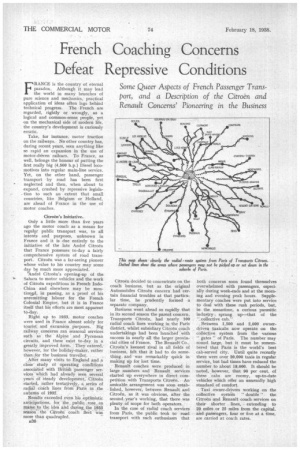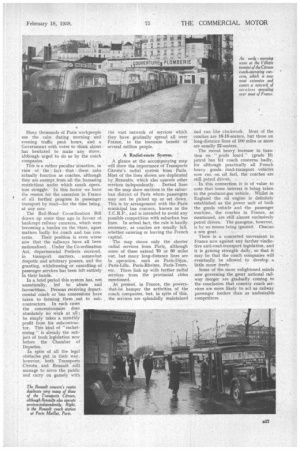French Coaching Concerns Defeat Repressive Conditions F RANCE is the country
Page 46

Page 47

If you've noticed an error in this article please click here to report it so we can fix it.
of eternal paradox. Although it may lead the world in many branches of pure science and mechanics, practical application of ideas often lags behind technical progress. The -French are regarded, rightly or wrongly, as a logical and common-sense people, yet on the mechanical side of modern life. the country's development is curiously erratic.
Take, for instance, motor traction on the railways. No other country has, during recent years, seen anything like so rapid an expansion in the use of motor-driven railcars. To France. as well, belongs the honour of putting the first really big (4,500 h.p.) Diesel locomotives into regular main-line service. Yet, on the other hand, passenger transport by road has been first . neglected and then, when about to expand, crushed by repressive legislation to such an extent that small countries, like Belgium or Holland, are ahead of France in the use of motor coaches.
Citroen's Initiative.
Only a little more than five years ago the motor coach as a means for regular public transport was, to all intents and purposes, unknown in France and it is due entirely to the initiative of the late Andre Citroen that France possesses to-day a fairly comprehensive system of road transport. Citroen was a far-seeing pioneer whose value to his country may some day be much more appreciated.
Andre Citroen's opening-up of the
1. Sahara to motor vehicles and the work of Citroen expeditions in French IndoChina and elsewhere may be mentioqed, in passing, as a proof of his unremitting labour for the French Colonial Empire, but it is in France itself that his efforts are most apparent to-day.
Right up to 1933, motor coaches were used in France almost solely for tourist and _excursion purposes. Big railway concerns ran seasonal services suth as the Alpine and Pyrenean circuits, and these exist to-day in a greatly improved form. They catered, however, for the holiday-maker, rather than for the business traveller.
._After many visits to England and a close study of operating conditions associated with British 'passenger -ser; vices which had already seen several years of Steady development –Citroen. started, rather tentative,ly, a series. of
• radial coach lines from' Paris in the autinam of 1932.. _
Results exceeded even his optimistic anticipations, for the public. ,rose, en =sae to the idea and during,..the 1933 seas-in the Citroen coaeh fleet Was. more than quadrupled.
Citroen decided to concentrate on the coach business, hut as the original Automobiles Citroen concern had certain financial troubles at that particular time, he prudently formed a separate company.
Business went ahead so rapidly that in its second season the parent concern, Transports Citroen, had nearly 100 radial coach lines working in the Paris district, whilst subsidiary Citroen coach undertakings had been launched with success in nearly all the larger provincial cities of France. The Renault Co., Citroen's keenest rival in all fields of business, felt that it had to do something . and was remarkably quick in making up for lost time.
Renault coaches were produced in large numbers and Renault services started up everywhere in direct competition with Transports Citroen. An amicable, arrangement was soon established, however, between Renault and Citroen, as it was obvious, after the second year's working, that there was plenty of scope for both operators.
In the case of radial coach services from Paris, the public took to road transport with such enthusiasm that both concerns soon found themselves overwhelmed with passengers, especially during week-ends and at the morning and evening peak hours. Supplementary coaches were put into service to deal with these rush periods, but, in the meantime, a curious parasitic industry sprang up—that of the ".collective cab."
Between 1,500 and 2,000 ownerdriven taxicabs now operate on the collective system from the various " gates " of Paris. The number may sound large, but it must be remembered that Paris is the world's best cab-served city. Until quite recently there were over 20,000 taxis in regular service, but bad times have reduced the number to about 18,000. It should be noted. however, that 90 per cent. of these cabs are roomy, up-to-date vehicles which offer an unusually high standard of comfort.
Taxi owner-drivers working on the collective system " double " the Citroen and Renault coach services on their shorter lines, extending to 20 miles or 25 miles from the capital, and passengers, four or five at a time, are carried at cow_..h rates. Many thousands of Paris workpeople use the cabs during morning and evening traffic peak hours, and a Government with votes to think about has hesitated to make any move, although urged to do so by the coach companies.
This is a rather peculiar situation, in view of the fact that these cabs actually function as coaches, although they are exempt from all the. harassing restrictions under which coach operators struggle. In this factor we have the reason for the cessation in France of all further progress in passenger transport by road—for the time being,. at any rate.
The Rail-Road Co-ordination Bill drawn up some time ago in favour of bankrupt railway concerns, which were becoming a burden on the State, upset matters badly for coach and bus con cerns. Their position is even worse now that the railways have all been nationalized. . Under the Co-ordination Act, departmental Prefects received, in transport matters, somewhat despotic and arbitrary powers, and the granting, withdrawing or cancelling of passenger services has been left entirely in their hands.
In a brief period this system has, not unnaturally, led to abuse and favouritism. Persons receiving departmental coach or bus concessions have taken to farming them out to subcontractors. In such cases the . concessionnaire does absolutely no work at all he simply takes a monthly profit from his subcontractor. This kind of " racketeering " is already the subject of fresh legislation now before the Chamber of Deputies.
In spite of all the legal obstacles put in their way, however, both Transports Citroen and Renault still manage to serve the public and carry on gamely with the vast network of services which they have gradually spread all over France, to the immense benefit of several million people.
A Radial-route System.
A glance at the accompanying map will show the importance of Transports Citroen's radial systena from Paris. Most of the lines shown are duplicated by .Renaults, which also operate other
services independently. Dotted lines on the map show sections in the suburban district of Paris where passengers may not be picked up or set down. This is by, arrangement with the Paris municipal bus concern, known as the T.C.R.P., and is intended to avoid any possible competition with suburban bus lines. In actual fact, the rule is hardly necessary, as coaches are usually full, whether entering or leaving the French capital.
The map shows only the shorter radial services from Paris, although some of these extend 70 or 80 miles out, but many long-distance lines are in operation, such as Paris-Dijon, Paris-Lille, Paris-Rheims, Paris-Tours, etc, These link up with further radial services from the provincial cities mentioned.
. t present, in France, the powersthat-be hamper the activities of the coach companies, but, in spite of this, the services are splendidly maintained and run like clockwork. Most of the coaches are 16-18-seaters, but those on long-distance lines of 100 miles or more are usually 22-seaters.
The recent heavy increase in taxation on " poids lourd " (grade B) petrol has hit coach concerns badly, for although practically all French heavy goods roadAransport vehicles now run on oil fuel, the coaches are still petrol driven. ..
In this connection it is of value to note that Some interest is being taken in the producer-gas vehicle. Whilst in England the oil engine is definitely established as the power unit of both the goods vehicle and the passenger machine, the coaches in France, as mentioned, are still almost exclusively petrol driven. The gasogene, however, is by no means being ignored. Chacun a son gout.
There is a concerted movement in France now against any further vindictive anti-road-transport legislation, and it is gaining strength daily, so that it may be that the coach companies will eventually be allowed to develop a little More freely.
Some of the more enlightened minds now governing the great national railway merger are gradually coming to the conclusion that country coach services are more likely to act as railway passenger feeders than as undesirable competitors.




















































































